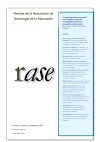Lo académico y lo profesional en los programas de cualificación profesional inicial. Los discursos y las prácticas del profesorado
DOI:
https://doi.org/10.7203/RASE.5.3.8333Keywords:
Initial professional qualification programs, notions of education, school dropout, social and labour insertion Abstract
Abstract
Initial professional qualification programs (PCPI, acronym in Spanish) are aimed at the prevention of early school dropout through assuring a labour qualification that students will be able to use in the labour market. Furthermore, the optional module (second year) constitutes an alternative way for obtaining the title for the Secondary Education. These programs are especially relevant in touristic contexts such as the Balearics, with a special impact of the early school dropout. 30 semi-structured interviews are undertaken with students, teachers, parents and orienteering teams in secondary schools of tourist areas of the Balearics. Research and fieldwork had two goals: the first goal is to know the performance of PCPI taking into account the contributions of the involved actors; the second goal is to analyse the discourses about education of the PCPI teachers, finding that these discourses move between the models of education as a tutorial relationship and education as a relation master-apprentice.
 Downloads
Downloads
Downloads
Published
How to Cite
-
Abstract267
-
PDF (Español)125
Issue
Section
License
![]()
This work is licensed under a Creative Commons Reconocimiento-NoComercial-CompartirIgual 4.0 Internacional.




